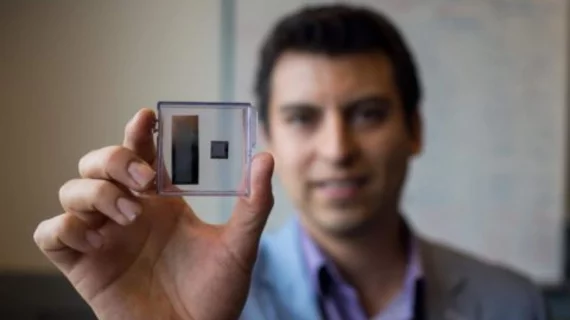Canadian researchers’ novel ultrasound machine costs $100 and can be controlled by a smartphone
Engineers from the University of British Columbia (UBC) in Canada who developed a new ultrasound transducer say it could lower the cost of ultrasound machines to just $100. The probe is portable, wearable and can be powered by a smartphone, according to a release published Sept. 11.
Research, published online in the August issue of Microsystems and Nanoengineering, details how the researchers replaced piezoelectric crystals within a conventional ultrasound scanner with a small, inexpensive vibrating drum constructed of polymer resin, called polyCMUTs (polymer capacitive micro-machined ultrasound transducers).
“Transducer drums have typically been made out of rigid silicon materials that require costly, environment-controlled manufacturing processes, and this has hampered their use in ultrasound,” lead author Carlos Gerardo, a PhD candidate in electrical and computer engineering at UBC, said in a prepared statement. “By using polymer resin, we were able to produce polyCMUTs in fewer fabrication steps, using a minimum amount of equipment, resulting in significant cost savings.”
Researchers found the device was able to produce sonograms more detailed than conventional ultrasounds.
Additionally, because the transducer only requires 10 volts of electricity to operate, it can be completely powered by smartphone technology and be used in remote or low-power locations.
“Unlike rigid ultrasound probes, our transducer has the potential to be built into a flexible material that can be wrapped around the body for easier scanning and more detailed views—without dramatically increasing costs,” added Edmond Cretu, PhD, professor of electrical and computer engineering at UBC.
The researchers plan to develop prototypes and test the device in clinical applications such as arterial or cardiovascular monitoring, according to the release.

